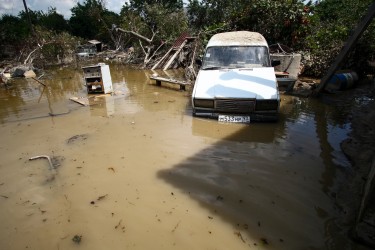Lost lives and destroyed livelihoods in Derbent are another reminder of the passivity and incompetence with which Russian authorities respond to disasters.
The night before Wednesday, October 10, heavy rain fell on the town of Derbent in Dagestan, a mountainous republic of Russia’s North Caucasus. Water surged through the streets forming flash floods and bringing devastation. According to the local authorities, 6 people died, buried under a mudslide; 320 houses flooded; and around 1,200 townspeople were trapped in the affected areas.
On the day of the flood, YouTube user Farid Pirahmedov captured the resulting havoc:
Photojournalist and blogger Aleksander Belenkiy, known online as macos [ru], visited Derbent ten days later; his account of what he witnessed can be found on his LiveJournal [ru].
In the disaster's aftermath, Dagestani officials visited the houses affected by the flood and deemed them once again habitable. Belenkiy's report [ru], however, paints a different picture. Some houses were destroyed completely, and many need significant repairs before they could be used as homes again. Belenkiy also describes Derbent locals working tirelessly to clear the roads and remove the mud and stones from their houses. Residents spent over a week cleaning up the town, a task that forced many to abandon their day jobs temporarily.
The town's water supply was also damaged, but a cistern with drinking water took days to arrive. In the meantime, residents had no choice but to buy bottled water. Officials finally restored potable water to Derbent a full two weeks after the flood, on October 24, according to a local news source [ru].
The locals’ commitment to helping each other stands in stark contrast to the authorities’ apparent indifference. In one of Belenkiy's photos [ru], a woman and her son can be seen cleaning a house that belongs to their neighbor, an 83-year-old literature teacher who lives alone.
In his account, Belenkiy draws parallels [ru] between the disaster in Derbent and the devastating flood that hit Krymsk earlier this year, where at least 171 people died and thousands of houses were submerged. Several local officials had been fired when citizen complained that authorities failed to warn them of the danger.
Казалось, что “крымская” история больше никогда не должна повториться: трагедия, всколыхнувшая всю страну, долго была в центре внимания общества. В зону чрезвычайного положения под Краснодаром приезжали политики и чиновники всех мастей, тысячи волонтёров, обычных людей, которые хотели помочь. […]
То, что случилось в Дербенте, очень похоже на события в Крымске. За исключением того, что сюда не приехали волонтёры со всей России, не прислали тонн гуманитарной помощи, а местные власти, похоже, вообще никакой помощи не оказали. До сих пор, спустя неделю, люди продолжают откачивать жижу и выкорчёвывать камни из стен своих домов.
It seemed that the “Krymsk” story would never again have to be repeated: the tragedy resonated across the whole country, [absorbing] society’s attention for a long time. All sorts of politicians and officials visited the affected area, and thousands of ordinary people volunteered to help. […]
What happened in Derbent is very similar to what happened in Krymsk. Except, volunteers from all over Russia didn’t rush to Derbent, tons of humanitarian aid weren’t sent, and local authorities seemingly didn’t offer any help whatsoever. So far, a week later, people continue to pump out mud from their homes and dig out the stones [lodged] in their walls.
The lack of a strong popular response to the tragedy in Derbent is notable and disappointing. In the aftermath of flood in Krymsk, Russia saw an outpouring of volunteer efforts [ru], with civil society and representatives of different political fractions coming together to aid Krymsk's citizens. Perhaps the indifference about Derbent's suffering lies in the fact that Dagestan is a republic plagued by radical Islamist insurgency, where violence and death occurs daily.
Dagestani authorities claim to have dispatched to Derbent a volunteer work crew 180-men-strong, made up of students from the Republic’s capital, Makhachkala. (During Belenkiy's visit, this volunteer army was nowhere to be found [ru].) Dagestani officials also announced that the Republic's government refused outside help from Russia's other regions.
The most striking aspect of Belenskiy's account is the senselessness of this tragedy. Only two years ago, Derbent experienced a similar flood; torrents of water running down the very same streets. The authorities had ample time to improve anti-flood defenses, but nothing was ever done. Even the calamitous flood in Krymsk wasn’t enough to break civil servants’ negligence. Lamenting the dismal state of governance in the country, Belenkiy finished his blog post by asking rhetorically [ru]:
Вот скажите мне, сколько ещё должно случиться крымсков, сколько бесланов, чтобы наконец что-то изменилось?
Tell me, how many more Krymsks, how many more Beslans [referring to the Beslan school hostage crisis], need to happen, before something changes?








